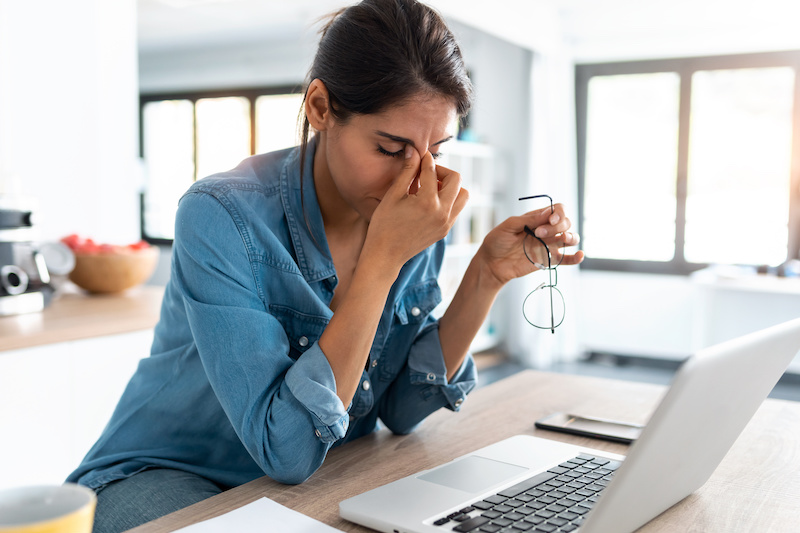By Dr. Jennifer L. Yocum, Licensed Acupuncturist
April is Stress Awareness Month, and most of us have some level of stress in our lives, whether minimal, moderate, or severe. There are many ways to lessen stress, whether its physical, emotional, or mental in nature. Here I share my top ten ways you can relieve stress this month and moving forward.
#1: Deep breathing
Deep breathing calms your nervous system, lowers blood pressure, and lowers your heart rate. When you find yourself in a particularly stressful situation, remember to breathe. Close your eyes, place one hand on your belly, and the other hand on your heart. Inhale for four counts, exhale for eight counts. Repeat several times, then return your breathing to normal. This practice will activate your parasympathetic nervous system, taking you out of that “fight or flight” mode and into “rest and digest” mode.
#2: Exercise/Move your body
April also happens to be “Move More Month” and moving your body through any type of exercise that feels good to you is a great way to relieve stress. Exercise naturally increases your endorphins, which are the “feel good” hormones, and even cause a “runner’s high” for some people (Mayo Clinic Staff, 2022). Exercise should be catered to your body and abilities, so there’s no one exercise that’s best for everyone. The easiest movement to start with is walking or a gentle practice such as tai ji or qi gong. Start moving and feel your stress lower!
#3: Laugh more
Much like exercise, laughing also releases endorphins, and reduces stress hormones in our bodies (Mayo Clinic, 2023). Even if you have to “fake it ‘til you make it,” the benefits of laughter still apply. So whether it’s hanging out with friends who always make you laugh, watching comedian television specials or clips, reading a comedy, or watching funny animal videos on YouTube, have a laugh. There’s even a style of yoga called “laughter yoga” where you practice laughing in different ways during the class, and it becomes incredibly contagious! As you laugh, it naturally brings you into a state of joy and happiness.
#4: Get enough sleep
Getting a proper night’s sleep is incredibly important for our overall health. When we don’t get enough sleep, it can cause or amplify stress. Most adults should be getting around 7-8 hours of sleep a night, ideally uninterrupted. It should be easy to fall asleep and if you wake up in the middle of the night, it should be easy to fall back asleep. You should feel well rested upon waking. If any of those things are off, it could be contributing to your stress, as well as other health issues you may be having.
Examine your sleep hygiene to determine if there are ways to improve your chances of a good night’s sleep. Stop looking at screens at least 2 hours before bed, or wear blue light blocking glasses. Do not read or watch activating stories/shows/movies before bed, because it will be hard for your mind to wind down after your adrenaline has been pumping. Do not drink a lot of water right before bed or you will be likely to wake up to pee. Do not drink caffeine after 3 pm (ideally only drink caffeine in the morning if you choose to drink it). Consider investing in blackout curtains, especially if you are a night shift worker or find yourself waking up before you’d like to because of the sunrise. If you snore or wake up often, consider talking to your primary care physician about getting tested for sleep apnea. Practice deep breathing or meditation before bed to help ease you into sleep. If all of these suggestions are insufficient, consider natural therapies such as melatonin supplementation or acupuncture treatment.
#5: Eat a healthy diet
We are finding out over time that food is medicine; every choice we make with our diet affects not only our physical health but also our mental health. Certain foods can even lower cortisol (the “stress hormone”), such as avocado, dark chocolate, bananas, spinach, pumpkin seeds, and fermented foods (Cleveland Clinic, 2021). Eating a diet that is comprised of mostly whole foods like fruits, vegetables, meat, seafood, and grains will benefit not only your stress levels but your entire body, mind, and spirit.
#6: Practice gratitude
Taking time to remember what we are grateful for each day helps to reduce stress and shift our focus to the things in our lives that are going well. Every morning, write down 2-3 things that you are grateful for so you can start your day on a positive note and in a state of abundance.
#7: Listen to music and sing
Singing along to your favorite songs can help to lower stress and put you in a good mood. Turn on some music, dance around your room, and belt your heart out and you’ll feel better in no time.
#8: Use essential oils
Research shows that lavender, orange, ylang-ylang, and bergamot essential oils can help reduce stress and induce a state of calmness and relaxation in the body (Sowndhararajan & Kim, 2016). Add one or more of these essential oils to a diffuser, or add several drops to a carrier oil and rub on your wrists to smell throughout the day.
#9: Practice healthy boundaries
When we do not honor our own needs and desires and say “yes” to someone’s request when we truly mean “no,” we create stress in the moment, throughout the process of completing the request, and in the future if we do not practice healthy boundaries. Stop the cycle by saying “no” when you mean no. Distance yourself from toxic people and situations as you are able, and instead surround yourself with supportive and loving people who bring you a sense of wellbeing and elevated mood.
#10: Pursue physical and mental healthcare
Take care of your body and mind by having regular checkups, seeing a mental health therapist if your stress feels unmanageable, and consider therapies such as acupuncture, nutrition, health coaching, massage, or yoga to support your overall health and reduce your stress.
By taking active steps to support your mental health, you can naturally lower your stress hormones, activate your parasympathetic nervous system, and feel more joy and peace in your life.
References
Cleveland Clinic (2021, June 14). Eat these foods to reduce stress and anxiety. Cleveland Clinic health essentials. https://health.clevelandclinic.org/eat-these-foods-to-reduce-stress-and-anxiety
Mayo Clinic Staff (2022, August 3). Exercise and stress: get moving to manage stress. Mayo Clinic. https://www.mayoclinic.org/healthy-lifestyle/stress-management/in-depth/exercise-and-stress/art-20044469
Mayo Clinic Staff (2023, September 22). Stress relief from laughter? It’s no joke. Mayo Clinic. https://www.mayoclinic.org/healthy-lifestyle/stress-management/in-depth/stress-relief/art-20044456
Sowndhararajan, K. & Kim, S. (2016). Influence of fragrances on human psychophysiological activity: with special reference to human electroencephalographic response. Scientia Pharmaceutica, 84(4): 724-752.
Note: This article was originally published in a local magazine for their April 2024 issue. For citation references, please contact Dr. Yocum at https://jenyocum.com/contact/


Recent Comments